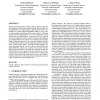Free Online Productivity Tools
i2Speak
i2Symbol
i2OCR
iTex2Img
iWeb2Print
iWeb2Shot
i2Type
iPdf2Split
iPdf2Merge
i2Bopomofo
i2Arabic
i2Style
i2Image
i2PDF
iLatex2Rtf
Sci2ools
104
click to vote
OOPSLA
1999
Springer
1999
Springer
Age-Based Garbage Collection
Modern generational garbage collectors look for garbage among the young objects, because they have high mortality; however, these objects include the very youngest objects, which clearly are still live. We introduce new garbage collection algorithms, called age-based, some of which postpone consideration of the youngest objects. Collecting less than the whole heap requires write barrier mechanisms to track pointers into the collected region. We describe here a new, efficient write barrier implementation that works for age-based and traditional generational collectors. To compare several collectors, their configurations, and program behavior, we use an accurate simulator that models all heap objects and the pointers among them, but does not model cache or other memory effects. For object-oriented languages, our results demonstrate that an older-first collector, which collects older objects before the youngest ones, copies on average much less data than generational collectors. Our r...
Related Content
| Added | 04 Aug 2010 |
| Updated | 04 Aug 2010 |
| Type | Conference |
| Year | 1999 |
| Where | OOPSLA |
| Authors | Darko Stefanovic, Kathryn S. McKinley, J. Eliot B. Moss |
Comments (0)

